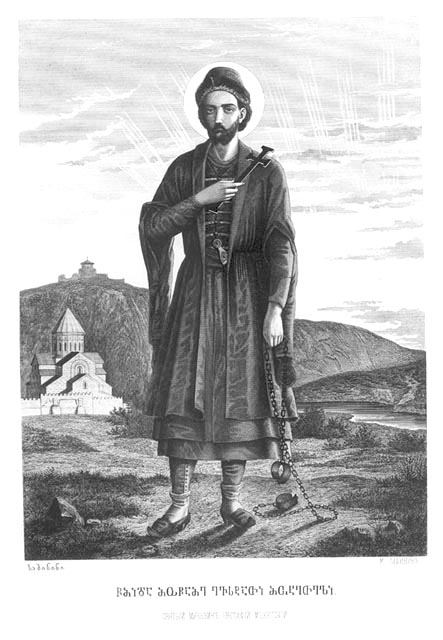- Eustathius of Mtskheta
Infobox Saint
name=Saint Eustathius of Mtskheta
birth_date=unknown (6th century)
death_date=c. 550
feast_day=July 29
venerated_in=Eastern Orthodoxy 
imagesize=
caption=Eustathius of Mtskheta (Sabinin, 1882)
birth_place=
death_place=Tbilisi , Georgia
titles=
beatified_date=
beatified_place=
beatified_by=
canonized_date=
canonized_place=
canonized_by=
attributes=
patronage=
major_shrine=
suppressed_date=
issues=
prayer=
prayer_attrib=Eustathius or Eustace of Mtskheta (Evstat'i Mtskhet'eli; _ka. ევსტათი მცხეთელი) (died c. 550) is an
Orthodox Christian saint , executed for his apostasy fromZoroastrianism by the Persian military authorities in Georgia. His story is related in the anonymous 6th-century Georgian hagiographic novel "The Passion of Eustathius of Mtskheta".One of the earliest extant works of the Georgian literature, "The Passion of Eustathius of Mtskheta" (მარტჳლობაჲ და მოთმინებაჲ წმიდისა ევსტათი მცხეთელისაჲ) was written by an anonymous author later in the 6th century, within thirty years of Eustathius' reported death. The morphology of the work as well as some theological phrases also supports this dating, although the earliest surviving manuscript dates from c. 1000 (
Georgian National Center of Manuscripts , MSS H-341). The text is also interesting for the first Georgian formulation of theTen Commandments , an account of the life ofJesus which recallsTatian 's "Diatessaron " (aGospel harmony of the 2nd century), and traces of influence of the 2nd centuryApology of Aristides . "The Passion" was first published byMikhail Sabinin in 1882.Rayfield, Donald (2000), "", pp. 44-45.Routledge , ISBN 0-7007-1163-5.]Eustathius is reported by the hagiographer to have been a Persian cobbler originally called Gvirobandak, son of a Zoroastrian priest (
magi ), fromGanzak . Having converted to Christianity, he flees persecution to Georgia (Iberia), then under the Persian military authority, in 541. He settles at the Christian town ofMtskheta and marries a Christian woman. The local Persian cobblers’ guild denounces Eustathius to themarzban Arvand Gushnasp with seven other converts to be judged. Arvand punishes the apostates by having their noses pierced and casts them in prison under sentence of death. Six months later, Arvand releases them, however, as a farewell gesture to the local people, when recalled from Georgia by the kingKhosrau I . Four years later, under the new marzban Bezhan Buzmir, Eustathius is rearrested, but reaffirms his faith before the court in a speech of some 3,000 words that makes up nearly half "the Passion". Eventually, the marzban, albeit reluctant, has him beheaded inTbilisi . [Lang, David Marshall (1976), "Lives and Legends of the Georgian Saints", pp. 95-99. Mowbrays:London and New York.]References
Wikimedia Foundation. 2010.
